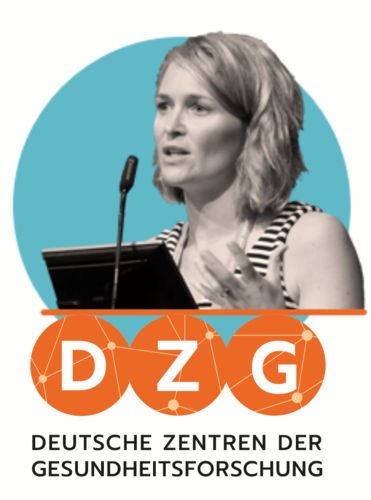Since 2009, the Federal Ministry of Education and Research has gradually launched the currently six German Centers for Health Research (DZG). It is the aim of the centers to combine skills and expertise throughout Germany in order to fight the major common disorders such as diabetes, infectious diseases, cancer, cardiovascular, pulmonary and neurodegenerative diseases. With around 90 participating research institutes, these centers form a powerful network to better recognize, treat and prevent these disorders. A further aim is to provide patients with research results more rapidly. To achieve this, basic researchers and clinicians will work hand-in-hand on the principle of „from bench to bedside“.
In order to include patients more closely in research and decision processes, each of the six German Centers for Health Research (DZG) has established its own structures. The German Center for Lung Research (DZL) has in Dr. Pippa Powell a representative of the largest European patient network (European Lung Foundation) as a member of the Scientific Advisory Board. She is thus directly involved in the decisions made regarding the future direction of research at the DZL and can actively introduce the concerns of those affected. „For a long time it was very difficult to convince the specialists in the healthcare sector to include the patients‘ perspective”, says Pippa Powell. „That has now fundamentally changed. Now the scientists in many of the meetings ask us about patients who can share their experiences.” Since 2016, Pippa Powell has been a member of the Scientific Advisory Board of the DZL and she directs the focus onto the priorities of those affected, such as the quality of life and then how therapy and treatment can be integrated into the daily life of patients, so that despite everything a relatively normal life is possible.
„With the digitalization in the care sector, we expect patients to monitor themselves and manage their illness. Therefore we can no longer maintain the separation between patients and experts, it must now be a partnership. ”, says Powell. To allow both partners to be able to communicate on the same level, the Lung Information Service offers information on diagnostics, therapy and current research set out in layman’s terms (www.lungeninformationsdienst.de). The DZL supports the Lung Information Service both financially and with the expertise of its researchers, who regularly check that the information is correct and up-to-date.
Patient participation goes far beyond purely being involved in studies, even if this continues to be an important and necessary means of improving research. The German Centers for Health Research (DZG), with their joint platform, therefore wish to inform those affected as well as interested family members how they can become involved in the research process and actively take part in shaping it.
More information here: https://deutschezentren.de/patientenbeteiligung-datenreiche-medizin/
Text: BREATH/ AB
Foto: DZG

Dr Pippa Powell, member of the Scientific Advisory Board of the DZL